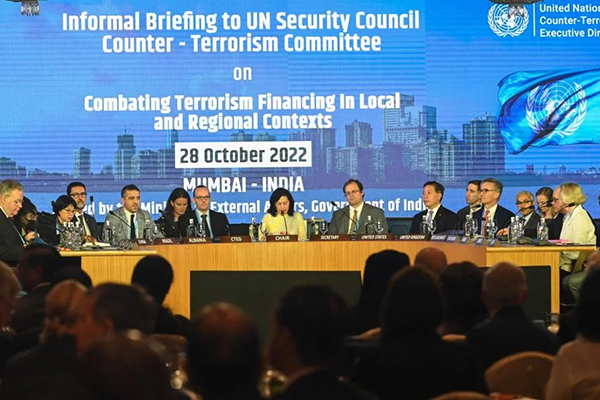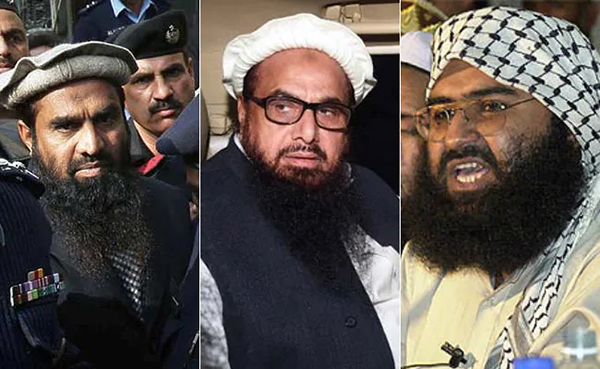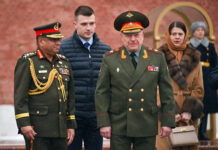
A proposal moved by India, co-sponsored by the US, to list Abdul Rauf Asghar, brother of Jaish-e-Mohammed (JeM) chief Masood Azhar and deputy chief of the Pakistan-based proscribed terror group, as a “global terrorist’ in the UN Security Council 1267 Sanctions Committee, was placed on technical hold by China. All other 14 member states of the UN Security Council were supportive of the listing proposal on 12 August. Listing him as a global terrorist would subject him to assets freeze, travel ban and arms embargo.
Azhar was involved in the planning and execution of several terror attacks, including the hijacking of Indian Airlines flight IC-814 (1999), attack on Parliament (2001), and attack on the Indian Air Force base in Pathankot (2016).
China sought to defend its move. “We need more time to assess the application to sanction this individual,” Chinese Foreign Ministry spokesman Wang Wenbin told a media briefing in Beijing while replying to a question. Wang said the 1267 Committee of the UNSC has clear provisions about designating terrorist organisations and officials.
This is not the first time that China has obstructed the listing of terrorists in the 1267 Sanctions Committee. In June this year, China placed on hold a joint proposal by India and the US to list the deputy chief of the Lashkar-e-Toiba (LeT), Abdul Rehman Makki, in the sanctions list. Makki was involved in raising funds, recruiting and radicalising youths to resort to violence and planning attacks in India, including the Mumbai terror attacks (2008), according to sources.
Terror tag against Sajid Mir also blocked
Agian on 17 September, China supported Pakistan by blocking a joint proposal moved by US and India to designate Muridke based Lashkar-e-Toiba (LeT)’s chief architect of 2008 Mumbai attacks Sajid Mir as specially designated global terrorist by the 1267 Al Qaida Sanctions committee of the UN Security Council.

This was the third proposal that has was put on hold by China after LeT’s top leader Abdul Rehman Makki, brother-in-law of designated terrorist Hafiz Saeed, and Jaish-e-Mohammed’s operational terror commander Mufti Rauf Azhar, younger brother of Masood Azhar.
Sajjd Mir was the key handler of the ten LeT terrorists who wreaked mayhem in Mumbai on November 26, 2008, in which over 166 Indian and foreigners including US nationals were gunned down. The 26/11 operation was a joint venture between Pakistani ISI and LeT and was controlled from Karachi. Mir was convicted by the Pakistani court in June 2022 for 15 years after Islamabad had declared the terrorist dead for many years.
The conviction was clearly done to seek brownie points with the FATF so that Pakistan is removed from the under watch “Grey List” of the global terror finance tracking watchdog. Since 2008, Mir was under protective custody of Pakistani deep state and was handling recruitment for the proscribed LeT. Intelligence inputs suggest that Mir had undergone facial surgery and was living on the outskirts of Islamabad.
Mir had joined the terror group after a career in Pakistan Army. During his stint in the army, he trained terrorists, expanded Lashkar’s reach across at least three continents, and plotted terror attacks in countries like Australia, Virginia in the United States and France.
Willi Brigitte, the French former naval cadet who joined terror ranks, revealed in an interrogation that Mir had ties to al Qaeda in Afghanistan and had direct access to Lashkar’s military chief Zaki-ur-Rehman Lakhvi. The Lashkar terrorist was handling the terror group’s overseas operatives and coordinated with the foreign recruits at the LeT headqua<
According to intelligence officials, Mir had passed himself off as a cricket fan to enter India in April 2005 and conducted reconnaissance of the Indian Military Academy at Dehradun and the National Defence College.
The US intelligence agencies later figured that it was Mir who ordered the Lashkar terrorists to take the head shot at the Holtzberg couple at Chabad House in Mumbai during the massacre.
Abdul Rehman Makki Case
A joint proposal by India and the US to list Pakistan-based terrorist Abdul Rehman Makki as a “global terrorist” was blocked by China in June 2022.
In November 2010, the US Department of the Treasury designated Makki as a Specially Designated Global Terrorist. As a result of this designation, among other consequences, all property, and interests in property, of Makki that are subject to US jurisdiction are blocked, and US persons are generally prohibited from engaging in any transactions with Makki.
The US Department of State’s Rewards for Justice programme is offering a reward of up to USD 2 million for information on Makki, “also known as Abdulrahman Maki”.
Makki has occupied various leadership roles within Lashkar-e-Taiba (LeT), a US-designated Foreign Terrorist Organisation (FTO). He has also played a role in raising funds for LeT operations.
“In 2020, a Pakistani anti-terrorism court convicted Makki on one count of terrorism financing and sentenced him to prison. The United States continues to seek information on Makki because the Pakistani judicial system has released convicted LeT leaders and operatives in the past,” according to information on the Rewards for Justice website.
Masood Azhar Case
In May 2019, India had won a huge diplomatic win at the UN when the global body designated Pakistan-based Jaish-e-Mohammed chief Masood Azhar as a “global terrorist”, a decade after New Delhi had first approached the world body on the issue.
A veto-wielding permanent member of the UN Security Council, China was the sole hold-out in the 15-nation body on the bid to blacklist Azhar, blocking attempts by placing a “technical hold”. All decisions of the committee are taken through consensus.
In 2009, India moved a proposal by itself to designate Azhar. In 2016 again India moved the proposal with the P3 – the US, the UK and France – in the UN’s 1267 Sanctions Committee to ban Azhar, also the mastermind of the attack on the air base in Pathankot in January 2016.
In 2017, the P3 nations moved a similar proposal again. However, on all occasions, China, a veto-wielding permanent member of the Security Council, blocked India’s proposal from being adopted by the sanctions committee.
Comments
Beijing’s move makes the communist nation a tacit supporter of terror groups based in Pakistan. It is now quite evident that any move by India with the support of P-5 sponsors will be blocked by China in support of Islamabad. The quid pro quo in this case is evidently the total silence from Pakistan over Chinese human rights violations and atrocities against Sunni Muslims in restive Xinjiang or East Turkestan province.
India has every reason to condemn China’s attempts to shield Pakistan, a notorious abettor of cross-border terrorism, on global platforms. The onus is on the international community to call out Beijing for its tacit support to Pakistani-origin terror, which poses a constant threat to peace and stability in South Asia.

















